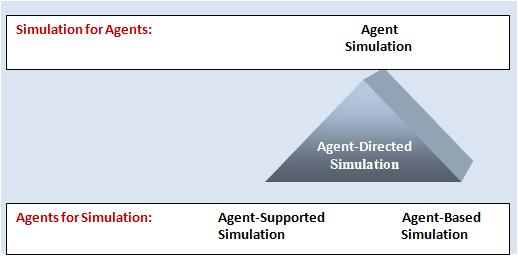
Call For Papers
Agent-Directed Simulation
Track at the European Modeling & Simulation Symposium 2008

|
Organizers:
Dr. Tuncer I. Ören, M&SNet of SCS, University of Ottawa, Ottawa, ON, Canada
M&SNet: Auburn M&S Laboratory, Computer Science and Software Engineering Auburn University, Auburn, AL, USA yilmaz@auburn.edu
|
 |
Track Description
Agent paradigm and its related theory and methodologies opened new frontiers for advancing the physical, natural, social, military, and information sciences and engineering. The purpose of this track is to facilitate dissemination of the most recent advancements in the theory, methodology, application, and toolkits of agent-directed simulation. Agent-directed Simulation consists of three distinct, yet related areas which can be grouped under two categories as follows:
|
Use of Simulation for Agents |
Use of Agents for Simulation |
|
Agent Simulation: simulation of agent systems. Agent simulation is already used in several categories of application areas such as: - Engineering applications: electrical engineering, irrigation systems, manufacturing systems, mechatronics, networks, robotics, software, as well as transportation/logistics; - Management/economy applications: economy, e-commerce, and management; - Social systems and human behavior applications: social systems, psychology/human behaviour, physiology, negotiation, and organization theory; - Environment applications: ecosystems, land use; - Military applications. |
Agent-supported Simulation: use of agents in a simulation study for at least one of the following purposes: (in a computer-aided simulation environment –including simulation-based problem solving environments): - to provide computer assistance for front-end and/or back-end interface functions; - to process elements of a simulation study symbolically (for example, for consistency checks and built-in reliability); and - to provide cognitive abilities to the elements of a simulation study, such as learning or understanding abilities. Agent-based Simulation: use of agents for the generation of model behavior in a simulation study.
|
Agent-Directed Simulation session of tracks aims to provide a leading forum to bring together researchers and practitioners from diverse simulation societies. The involvement of various agent-directed simulation groups will enable the cross-fertilization of ideas and development of new perspectives by fostering novel advanced solutions, as well as enabling technologies for agent-directed simulation.
|
Technical papers are solicited. Topics include, but are not limited to the following areas: |
|
Topics |
||
|
|
||
| Theory: | Methodology: | |
|
Agent-based computational organization theory |
Agent-based simulation systems engineering |
|
|
Agent simulation of anticipatory systems |
Agents in support of simulation methodologies |
|
|
Agent simulation architectures |
Computational autonomy |
|
|
Cooperative autonomy and coalitions |
Control of agent-based systems |
|
|
Deliberative, interpretive, and social agents |
Design and validation of agent simulations |
|
|
Formal models of agents and agent societies |
Emergent law discovery in agent simulations |
|
|
Holonic agent systems for cooperation and coopetition |
Human behavior modeling and simulation |
|
| Models of competition, cooperation, coopetition, and negotiation |
Simulation of self-organization |
|
|
Agents with understanding abilities for simulation |
||
|
|
||
| Applications: | Tools, Toolkits, and Environments | |
| Business, commerce, and transportation | Distributed simulation for multi-agent systems | |
| Computational biology, health sciences | CASE tools for agent-directed simulations | |
| Ecosystems, environment, urban planning | Agent modeling tools and simulation engines | |
| Military applications | Agent simulation programming languages | |
| Computational economics and finance | Standard APIs for agent simulation programming | |
| Human and social dynamics | Agent simulation verification, validation, testing tools | |
| Engineering and manufacturing | ||
Key Dates
Submissions of Extended Abstracts (first submission) April 12, 2008
Notification of acceptance: May 20, 2008
Final Camera-Ready Submission and Early Registration: June 10, 2008
Authors' Guidelines (further information author’s instruction section)
FIRST SUBMISSION
Extended abstracts (minimum 2 pages), full draft papers or other proposals should be submitted for the review process through the submission section by April 12, 2008.
The extended abstract or the full draft paper must contain title, authors, affiliations, addresses, main body and references.
Each extended abstract or full draft paper will be reviewed by at least two members of the International Program Committee taking into consideration scientific quality, originality and relevance. Only original papers, written in English will be accepted.
The extended abstract or the full draft paper should be prepared by following the final paper formatting. However any type of paper formatting can be accepted for the first submission.
NOTIFICATION OF ACCEPTANCE
Notification of acceptance will be sent by May 20, 2008.
CAMERA READY PAPER SUBMISSION
The International Program Committee will accept two types of camera ready papers: extended paper (10 pages, 2 columns); regular paper (6 pages, 2 columns) both for regular and special sessions.
The camera ready paper must adhere to the conference template. The .dot file contains the complete instructions for preparing a camera ready copy for the Proceedings. The final version of the paper must be a PDF file.
Your camera ready paper (extended paper or regular paper) in PDF format must be submitted by using the submission section before the 10th of June 2008
The page limit for manuscripts is ten (10) pages (included in the author registration fee). Additional pages will require an additional fee.
If your work must be cleared or approved before publication by your institution, company, or governmental agency, please be sure that process will be completed by the due date above or we will not be able to include it in the CD Conference Proceedings.